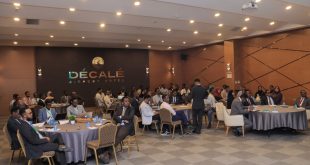MOGADISHU — The National Forum on Climate Outlook, which spanned two days, officially concluded today in the Somali capital, Mogadishu. The event ended with recommendations calling for strengthened cooperation between local and international bodies to counter the effects of climate change and build the country’s capacity for forecasting and responding to climate emergencies.
The forum focused on issues related to climate outlook, the impact of climate change in Somalia, and ways to bolster cooperation between national and international institutions. The closing events saw broad participation from representatives of the Ministries of Water, Fisheries, Agriculture, and Livestock, along with government agencies such as the Somali Civil Aviation Authority (SCCA) and the Somali Disaster Management Agency (SoDMA). Representatives from prominent international organizations, including the UN’s Food and Agriculture Organization (FAO) and the World Meteorological Organization (WMO), were also present, alongside experts from universities and civil society organizations.
During its sessions, the forum delved into the climate outlook for the 2025 autumn (Deyr) season, leveraging information and experiences gained from the spring season, and discussing the climatic impact on the lives of the Somali community, particularly the repercussions of tropical phenomena.
Dr. Guleed Abdulkadir Artan, Somalia’s representative at the World Meteorological Organization, read the official press release from the forum, which specifically focused on the autumn season forecast and how to prevent potential damages. Mr. Etienne Peterschmitt, FAO representative for Somalia, and Mr. Mohamed Ali Yasir, head of the Karuusa program in East Africa on behalf of the WMO, also delivered speeches, emphasizing their agencies’ roles in supporting the development of climate forecasting institutions in Somalia.
The forum concluded with a call for close cooperation between local and international agencies to address the devastating impacts of climate change, and to strengthen the country’s capacity for weather forecasting and effective response to climate emergencies.
Background: The Role of Somalia’s Ministry of Environment in Combating Climate Change
Somalia’s Ministry of Environment and Climate Change holds a central responsibility in formulating and implementing national policies related to environmental protection and confronting climate challenges. The ministry works to coordinate government and international efforts to mitigate the effects of climate change, which include drought and floods, through awareness programs and strategic planning aimed at building more resilient communities.
The ministry also seeks to enhance Somalia’s ability to meet its international environmental commitments by preparing national reports and participating in international forums, ensuring the country receives the necessary technical and financial support for adaptation and mitigation projects. The organization of this forum serves as proof of the ministry’s commitment to promoting scientific research and cooperation as key tools for building a sustainable environmental future for Somalia.
 Somali Observatory for Humanitarian Affairs It is a specialized, independent, non-profit media network that observes and follows up the Somali humanitarian scene
Somali Observatory for Humanitarian Affairs It is a specialized, independent, non-profit media network that observes and follows up the Somali humanitarian scene



